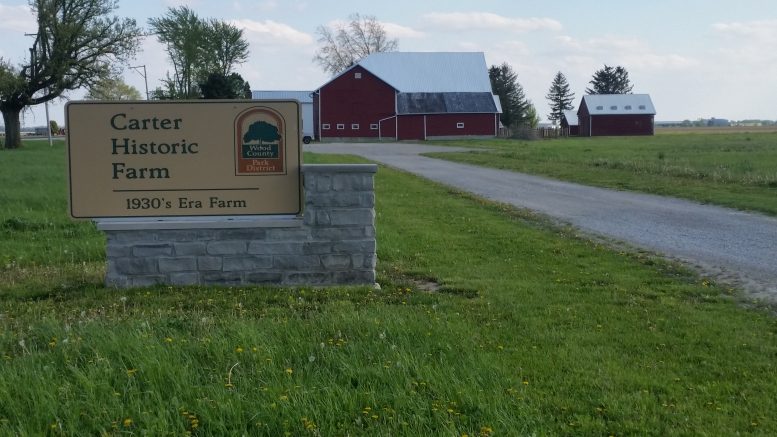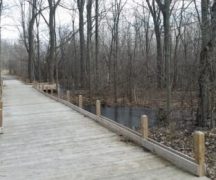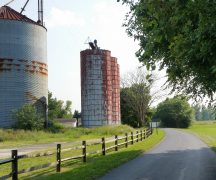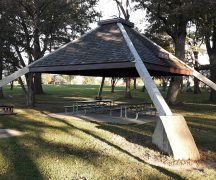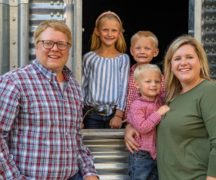By JAN LARSON McLAUGHLIN
BG Independent News
Twenty acres of farmland north of Bowling Green may be allowed to return to its former state as part of the Great Black Swamp.
Wood County Park District Director Neil Munger is excited about the park acreage becoming a piece of history and a habitat for wetland wildlife.
But the man who has farmed the acreage for four decades isn’t sold on the change.
Tom Carpenter doesn’t need the 20 acres for his livelihood. But as a farmer, it just grates on him that well-drained land will be forced back to its wetland roots.
And during an open house on the wetlands plan last week, Carpenter didn’t mince words.
“Our goal is to keep it farmland,” he said.
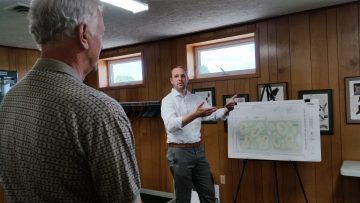
Jordan Rofkar explains wetlands plan to Tom Carpenter.
The 20 acres sit in the back property of the Carter Historic Farm. Other acreage on the farmstead will continue to be farmed. The wetlands project, as proposed by the Black Swamp Conservancy and designed by Hull and Associates, would render 20 acres of farmland unfarmable in the future.
The wetlands would have several benefits, according to Melanie Coulter, of the Black Swamp Conservancy. It would filter runoff before it goes into the nearby Toussaint Creek. It would provide habitat for wetlands habitat. And it would give the public a place to view swamp-like conditions that once covered this region.
The drain tiles currently in the 20 acres would be blocked to allow the land to flood, explained Jordan Rofkar, of Hull and Associates. Dirt would be moved to create low areas for water and mounds for native trees and shrubs.
“The intent is to create a mixture of habitats,” Rofkar said.
The small open ponds should attract turtles and frogs, along with birds like herons, ducks and woodcocks, Coulter said.
The wetlands should also benefit the water quality for one of the streams that flows into the Maumee River “area of concern,” designated by the U.S. and Ohio EPA, she said.
“Wetlands are known to do a lot of water filtration,” she said.
For Munger, showing park visitors the historic farm’s previous state and “recreating the Great Black Swamp” is a great opportunity. The park district’s trail through the nearby wooded area may be expanded into the wetlands – possibly as a boardwalk, he said.
He is hoping the bulk of the estimated $300,000 cost to transform the area into wetlands will come from grant funding. The proposal will be presented to the park district board of commissioners next for their decision to proceed or not.
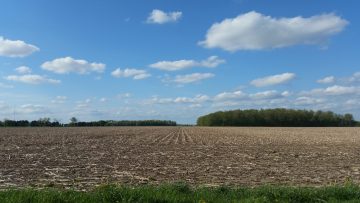
Proposed wetlands area
Carpenter hopes the park board will reconsider. He believes that Sally Loomis Carter, who gave her family’s farm to the park district, would not have wanted the farmland to return to swamp. After all, her family worked hard to drain the acreage so it could be fertile farmland
“This is not something she would have wanted to do,” Carpenter said during the open house on the plans.
But Munger disputed that viewpoint. Family members and former park staff who knew her, feel that Carter would have been pleased with the plan.
Carpenter suggested that if the goal is to keep the waterways clean, that a buffer strip be planted along the ditch.
He also quoted the Black Swamp Conservancy’s mission statement, which addresses protecting farmland.
“This is the opposite of that,” Carpenter said.
But Rob Crain, executive director of the Black Swamp Conservancy, said that the easement for the area addresses protection of agricultural heritage and wildlife.
“Sally signed the easement,” Crain said.
Carpenter argued that Carter’s focus would have been on the farmland.
“That was her goal, to preserve the farmland,” he said, adding that he could not imagine Carter wanting her fields to be reverted back to wetlands.
But Coulter said the easement language mentions farm and parkland.
“The intent was to create a public park for the community,” Crain said.
And the loss of wetland in the region has been staggering, Crain said, with 95 percent of it drained.
“We’re out of equilibrium,” he said.
Though still not convinced, Carpenter said he appreciated the open house. “I’m glad of the democratic process, so we can discuss this,” he said.

